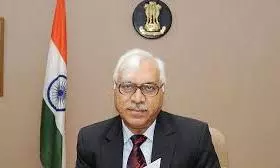
Former election chief dismisses DOGE’s claim of US funding for voter turnout in India
text_fieldsFormer Chief Election Commissioner SY Quraishi has strongly refuted claims that US funding was used to boost voter turnout in India during his tenure.
His response came after the US Department of Government Efficiency (DOGE), led by Elon Musk, announced budget cuts, including the cancellation of a $21 million allocation reportedly meant for India's electoral process.
In a social media post on X (formerly Twitter), DOGE revealed a list of cancelled programs, including a $486 million grant to the Consortium for Elections and Political Process Strengthening (CEPPS). This included a specific $21 million earmarked for increasing voter turnout in India.
Reacting to the claim, Quraishi firmly denied any such financial involvement from a US agency during his tenure as the Chief Election Commissioner (CEC) from 2010 to 2012.
Calling the report baseless, Quraishi clarified that while the Election Commission of India (ECI) did sign a Memorandum of Understanding (MoU) with the International Foundation for Electoral Systems (IFES) in 2012, it had no financial component.
"The claim that an MoU during my tenure involved millions of dollars from a US agency for raising voter turnout in India has no factual basis," Quraishi stated.
He explained that the agreement was similar to those the ECI had with various international election bodies and was purely for training purposes at the India International Institute of Democracy and Election Management (IIIDEM). The MoU explicitly stated that there would be no financial or legal obligations for either side.
The revelation by DOGE triggered a political debate in India. BJP leader Amit Malviya accused the now-cancelled program of being an attempt at foreign interference in India’s electoral process.
"Who benefits from this? Certainly not the ruling party," Malviya posted on X, suggesting that the previous Congress-led UPA government may have enabled external influence over Indian institutions.
Dismissing the allegations, Quraishi reiterated that the MoU had no financial agreements and that any mention of US funds linked to it was completely false and misleading.
"This stipulation was made in two different places within the MoU to eliminate any ambiguity," he said, emphasising that the ECI maintained complete independence in conducting elections.























